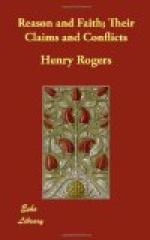____
* If such a man says that he rejects certain doctrines, not on rationalistic grounds, but because he denies the canonical authority, or the interpretation of portions of the records in which they are found, and is willing to abide by the issue if the evidence on those points—evidence with which the human mind is quite competent to deal,—we answer, that he is not the man with whom we are now arguing. The points in dispute will be determined by the honest use of history, criticism, and philology. But between such a man and one who rejects Christianity altogether, we can imagine no consistent position.
____
Nor can we disguise from ourselves, indeed, that consistency in the application of the essential principle of Rationalism would compel us to go a few steps further; for since, as Bishop Butler has shown, no greater difficulties (if so great) attach to the page of Revelation than to the volume of Nature itself,—especially those which are involved in that dread enigma, ‘the origin of evil,’ compared with which all other enigmas are trifles,—that abyss into which so many of the difficulties of all theology, natural and revealed, at last disembogue themselves,—we feel that the admission of the principle of Rationalism would ultimately drive us, not only to reject Christianity, but to reject Theism in all its forms, whether Monotheism, or Pantheism, and even positive or dogmatic Atheism itself. Nor could we stop, indeed, till we had arrived at that absolute pyrrhonism which consists, if such a thing be possible, in the negation of all belief,—even to the belief that we do not believe!
But though the objections to the reception of Christianity are numerous, and some insoluble, the question always returns, whether they over balance the mass of the evidence in its favour? nor is it to be forgotten that they are susceptible of indefinite alleviation as time rolls on; and with a few observations on this point we will close the present article.
A refinement of modern philosophy often leads our rationalist to speak depreciatingly, if not contemptuously, of what he calls a stereotyped revelation—revelation in a book. It ties down, he is fond of saying, the spirit to the letter; and limits the ‘progress’ and ‘development’ of the human mind in its ‘free’ pursuit of truth. The answer we should be disposed to make is, first, that if a book does contain truth, the sooner that truth is




